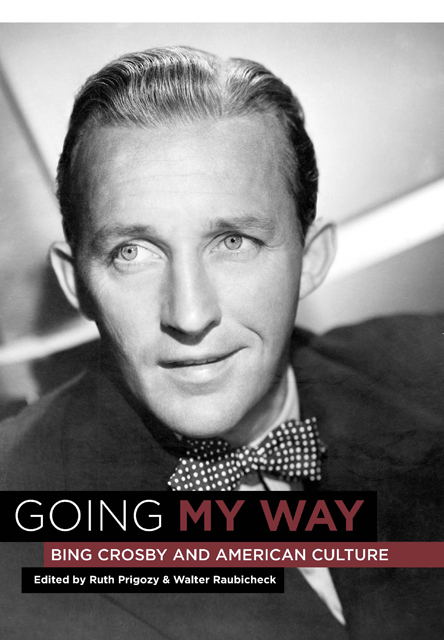Book contents
- Frontmatter
- Dedication
- Contents
- List of Illustrations
- Foreword
- Preface
- Acknowledgments
- Introduction Bing Crosby—Nothing Is What It Seems
- Part 1 Theoretical Perspectives on Crosby
- Part 2 Cultural Perspectives on Crosby
- Part 3 Historical Perspectives on Crosby
- Personal Comments
- Selected Bibliography
- List of Contributors
- Index
3 - Saint Bing: Apatheia, Masculine Desire, and the Films of Bing Crosby
Published online by Cambridge University Press: 11 March 2023
- Frontmatter
- Dedication
- Contents
- List of Illustrations
- Foreword
- Preface
- Acknowledgments
- Introduction Bing Crosby—Nothing Is What It Seems
- Part 1 Theoretical Perspectives on Crosby
- Part 2 Cultural Perspectives on Crosby
- Part 3 Historical Perspectives on Crosby
- Personal Comments
- Selected Bibliography
- List of Contributors
- Index
Summary
Bing Crosby was a pervasive presence in the lives of many Americans during the 1930s and 1940s. As his musical personality progressed from a “hot” scatting jazz singer to a smooth genre-spanning “American troubadour,” he also became more than a singing voice to the American public through his film and live appearances. Crosby's laid back personal style, coupled with a growing mellowness in vocal technique and song selections, branded him as “cool” before the rise of bebop and “cool” jazz. Crosby's “coolness”—a self-control and personal authority, tempered by a casual use of that authority—became his signifying trait.
In his article, “Masculinity as Spectacle: Reflections on Men and Mainstream Cinema,” Steve Neale writes: “Inasmuch as films do involve gender identification, and inasmuch as current ideologies of masculinity involve so centrally notions and attitudes to do with aggression, power, and control, it seems to me that narcissism and narcissistic identification may be especially significant.” Crosby's star image apparently lacks these qualities, until we realize that his persona emphasizes a self-control that governs the masculine aggressive streak and eventually leads to power. Thus, if “narcissism and narcissistic identification both involved phantasies [sic] of power, omnipotence, mastery and control” for filmgoers watching stars, then Crosby triggered male fantasies of achieving power while not blatantly desiring it and using this power to persuade rather than force people into compliance.
Bing Crosby's on-screen image not only operates as a sign of identification for male viewers, but also as an unusual object of desire for female viewers. Crosby is a desiring but unaggressive male whom women viewers could desire without threat of male violence. Crosby lacks the aggressive sexuality of Clark Gable, the energetic ambition of James Cagney, and the physical grace of Fred Astaire. He does not win women through physical appeal or force. He relies on his voice, which his biographer Gary Giddins credits with eroticizing American song, and passive-aggressive manipulation.
- Type
- Chapter
- Information
- Going My WayBing Crosby and American Culture, pp. 35 - 46Publisher: Boydell & BrewerPrint publication year: 2007



